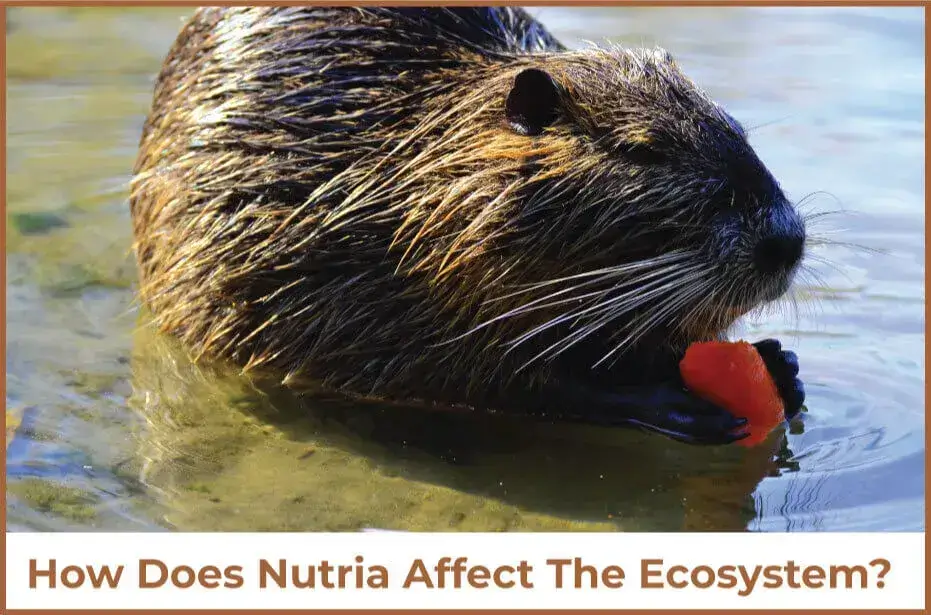
Each species, whether a tiny microbe or a large predator, is essential in the complex biotic community. The ecosystem’s balance runs smoothly until a non-native species is introduced. The balance of the ecosystem can be disrupted and lead to harmful consequences by introducing non-native species.
Nutria are partially aquatic rodents found in the natural habitat of South America that are now found in different parts of the world. Nutria affect the ecosystem at an alarming range. After being introduced to the fur industry and for meat production, these rodents were released into their non-native habitat and caused destruction. Let’s go further and understand the ways nutria affect the ecosystem.
Nutria Affect The Ecosystem Damage
The different ways these rodents affect the environment are listed below.
Habitat Alteration
The prolific herbivorous feeding habit of these nutria primarily affected the ecosystem. They eat aquatic plants, leaves, roots, and tubers in their natural habitat. They are known because of their voracious
appetite. Therefore, their continuous feeding habit affected the wetlands, lakes, and marshes, which are habitat sources for several animals and plants. They don’t just chew on leaves but instead consume flora, including the roots, which makes it impossible for them to grow back.
Explore: Nutria Diet/Food
Soil Destruction
Because of their overgrazing habit, Nutria has eradicated vegetation from the surface of marshes. In wetland areas and marshes, these rodents can pull up vegetation and damage the soil. Because of overgrazing, the soil turns into bare patches prone to erosion by wind and water. Because of this soil erosion, the nutrient cycle and water quality disruption occur, affecting the ecosystem.
Habitat Mitigation
The nutria are considered invasive rodents because of their destructive feeding habit. Their feeding habit caused a significant impact on the ecosystem. They can close their mouths behind the incisor teeth and, therefore, can cut aquatic vegetation very quickly, such as roots, grains, rhizomes, stems, leaves, water lilies, and duckweed. These aquatic rats quickly consume the aquatic vegetation, plants, and crops, destroying wetlands’ natural habitats and causing biodiversity loss.

Subdue With Native Species
The nutria are voracious eaters and subdue the ecosystem’s native species for food, shelter, and nesting. Besides this, they are prolific breeders, and their reproduction rate is relatively large. The lack of natural predators in the natural ecosystem often increases this competition. Because of this competition and destruction of the ecosystem, many species are reaching their extinction rate.
Risk To Agriculture Production
Nutria affects the ecosystem by risking agriculture production. The burrowing habit of these rodents poses damage to the production of agriculture and harms the infrastructure. Besides the damage to agriculture and wetlands, in many regions like Louisiana, they are the reason for weakened drainage canals.
Health Concerns
Nutria are rodents that are susceptible to different diseases. They are prone to various infectious and transmissible diseases. Because of their ability to develop diseases, they can transmit them to other wild species and even humans. Therefore, they are the reason for risking the lives of many wildlife species, particularly in the regions where they are abundantly found.
Combating The Voracious Invaders
Combating the Nutria population is problematic. The high reproduction ability of these invaders makes it challenging to control their population. A strategic approach to addressing the negative impacts of these rodents is essential. It is indisputable that Nutria affects the ecosystem broadly, but their population can be controlled by habitat modification. The following measures help eradicate their ecological impact.
- Habitat Modification & Restoration
- Measures to control population
- Communal Education
Besides this, implementing biological control, trapping, and hunting these rodents can help to control their population.
Summing Up!
The presence of these little and innocent rodents in the ecosystem shows the interconnection of the wild habitat. Although these rodents look cute initially, Nutria affects the ecosystem because of their overgrazing and herbivorous feeding. Preserving the natural ecosystem by mitigating the negative impact these rodents have on it is essential. Understanding the damage they cause to the ecosystem would make it easy to manage their population.

